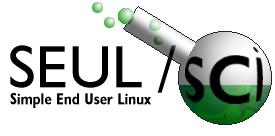
 |
Linux in science report #4 |
|---|
| Previous Report | Reports Page | Next Report |
|---|
|
15 Apr 2000--In the last couple of weeks, we've had an interesting discussion
on some of the tools necessary for the use of Linux in science. One such 'killer
app' for science is a general program for data management that is flexible enough
to interface to existing open source apps to do many of the tasks fairly common
in science - graphing (Grace and Guppi), visualization (XGobi),
analysis R), databases (postgres, MySQL) amongst other things.
One problem with writing a general "scientific" application is that there are so many
different disciplines involved, and many of them have tools particular to their own
fields.
Thus, any app that aims to be generally usable by people in different disciplines will have to be able to take this into account. Discussion is ongoing. Elsewhere, one problem with the adoption of Linux in universities is the lack of specific resources for undergraduate work (analysis, presentation). To rectify this, Matias Mutchinick is working with his colleagues at UNAM to produce a distro of Linux specifically for the needs of their faculty's students. Called "Gulfi Linux," it is being produced by the "Linux User Group of the Faculty of Engineering of the UNAM."
"The whole idea of the distro is because we want to get the students of the faculty of engineering to know and use Linux and we thought that the best way to do it is to grant them the tools they can use for their studies / work." This is a great approach, as it enables an institutional standard to be used and supported by departmental computing. It also reduces student and institutional licencing costs, and ensures that all tools required by students are readily available both at home, in the dorm and in the lab. I look forward to seeing how this develops. In the meanwhile, any suggestions for a good, stable productivity suite would be appreciated
DejasearchDejasearch is a perl program which gives the user more flexibility than that offered by the default interface to the DejaNews archival / search service. This doesn't exactly fit the "scientific apps" category, I know. Since there are numerous news groups in the sci.* hierarchy that often contain useful info, any tool making searching more effective (read: faster) is worth examining. (GPL) Dejasearch can be obtained from http://homemade.hypermart.net/dejasearch/
gEDAA long-time project hosted here at SEUL, the GPL Electronic Design Automation (gEDA) Project is probably our largest hosted project thus far, and one of our most active.From the web page at http://geda.seul.org/:
The gEDA project is working on producing a full GPL'd suite of Electronic Design Automation tools. These tools are used for electrical circuit design, simulation, prototyping, and production. The gEDA project was started because of the lack of free EDA tools for UNIX. The tools are being developed mainly on GNU/Linux machines, but considerable effort is being made to make sure that gEDA runs on other UNIX variants. The geda-dev list at SEUL is very active. In the last week alone, a code snapshot was released for the verilog package, as well as an RPM for the gtkwave. The latest ivl test suite snapshot was released earlier in the week. Also, code for the Linux/Alpha version of gEDA was brought up to date on Thursday. Many of the developers on gEDA are using it in their own electronics design work on a regular basis, forsaking the expensive commercial tools used by their companies. The complete list of tools within the gEDA suite can be found at http://geda.seul.org/tools/ Previous discussions can be found in the archives, and development snapshots for all packages can be downloaded here (GPL)
OctaveGNU Octave is a program for numerical analysis, simulations of dynamic systems and the like. Mostly compatible with Matlab, it works in both an interactive command-line mode as well as via batch files. (GPL)From the web page at http://www.che.wisc.edu/octave/:
Octave has extensive tools for solving common numerical linear algebra problems, finding the roots of nonlinear equations, integrating ordinary functions, manipulating polynomials, and integrating ordinary differential and differential-algebraic equations. It is easily extensible and customizable via user-defined functions written in Octave's own language, or using dynamically loaded modules written in C++, C, Fortran, or other languages.
R: UpdateThe R Project has released version 1.0.1 of the R Statistical Program. According to the NEWS file, most of the changes are fixes to small bugs. This version of R can be downloaded from ftp://cvs.r-project.org/pub/CRAN/src/base/R-1.0.1.tgz. Alternatively, it should be available from http://www.r-project.org/ or any CRAN mirror in the next day or so. (GPL)
TeXmacsMaintained by Joris van der Hoeven at CNRS, TeXmacs is a WYSIWYG scientific text editor 'inspired by TeX and emacs' (GPL)From the web page at http://www.math.u-psud.fr/~anh/TeXmacs/TeXmacs.html:
The program implements high quality typesetting using TeX fonts, but it is also provides a user friendly interface. The high typesetting quality also goes through for automatically generated formulas; this makes TeXmacs suitable as an interface for computer algebra systems. Finally, TeXmacs supports the Guile/Scheme extension language, which makes it possible to adapt the user interface to specific needs and even to extend the editor.
FFT resourcesJoerg Arndt has recently announced an updated release of his FXT package, a C++ library containing code for:
The package can be found, along with a very substantial set of resources for FFT and related transforms in C and Fortran, at the http://www.jjj.de/fxt/ site. (GPL)
-- Pete St. Onge (pete@seul.org) |
| Previous Report | Reports Page | Next Report |
|---|
| Please report any technical problems to webmaster@seul.org. |